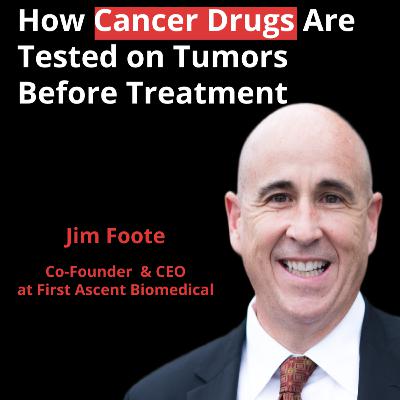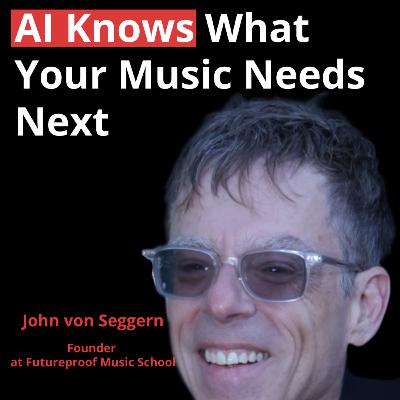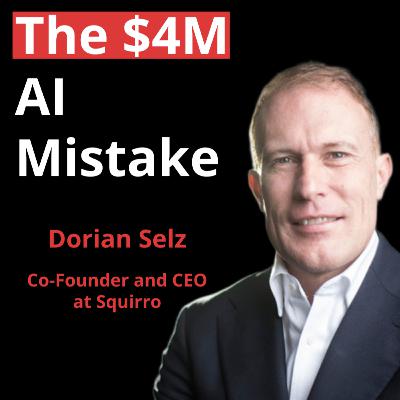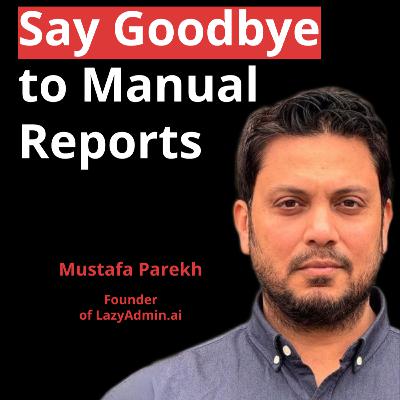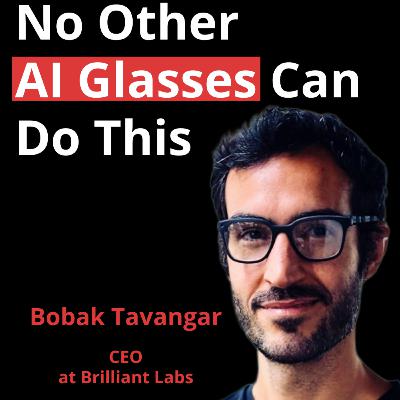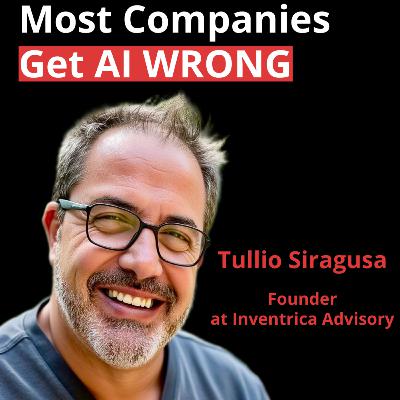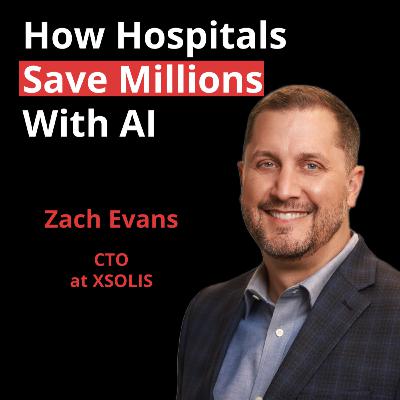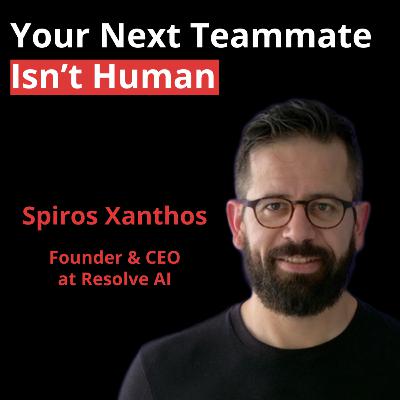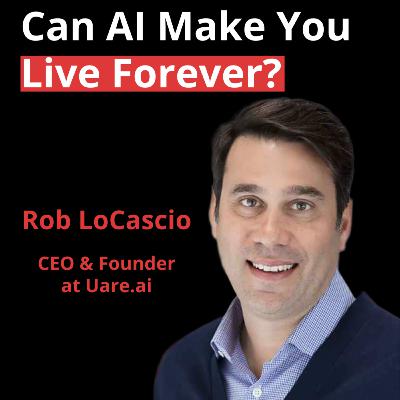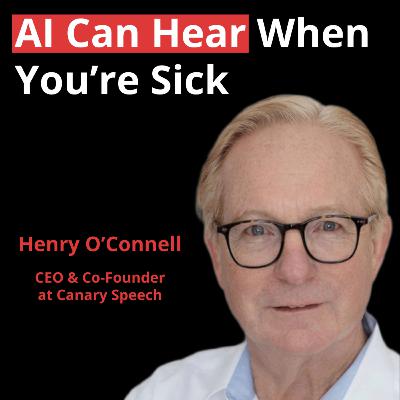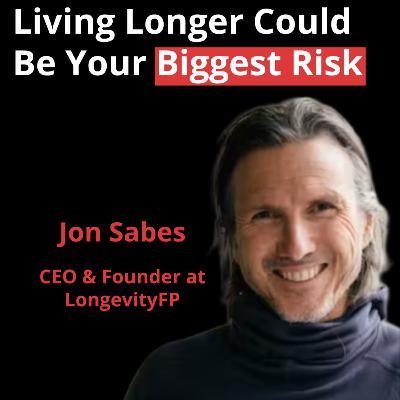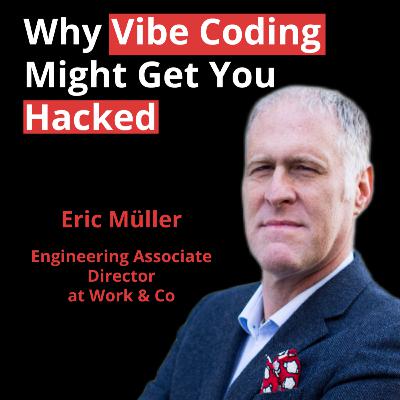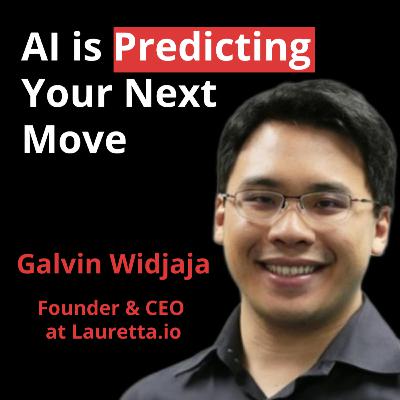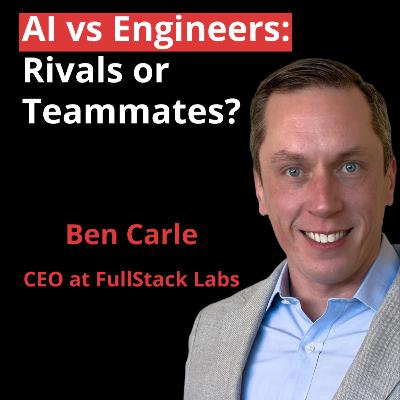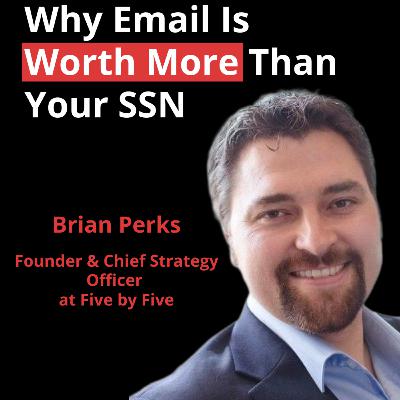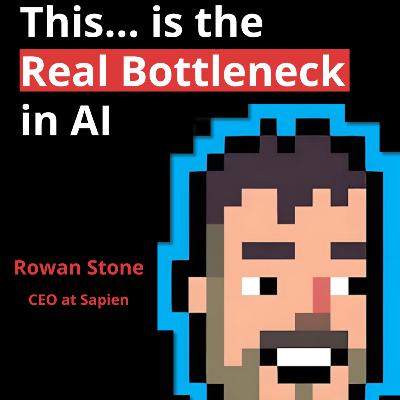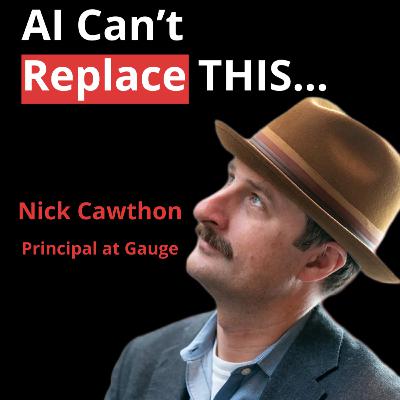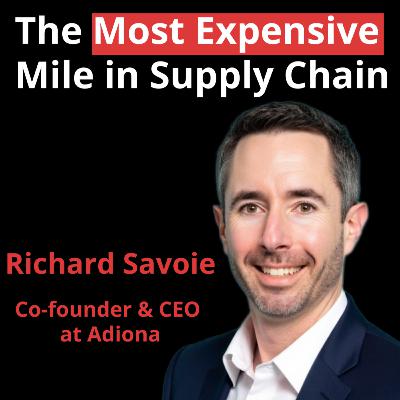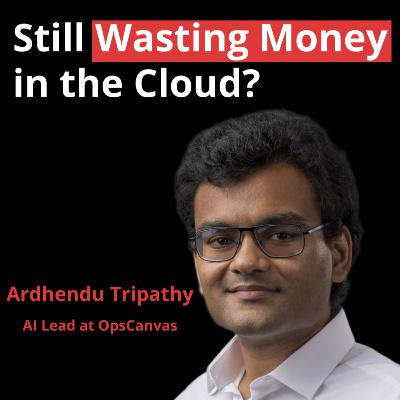Discover An Hour of Innovation with Vit Lyoshin
An Hour of Innovation with Vit Lyoshin

An Hour of Innovation with Vit Lyoshin
Author: Vit Lyoshin
Subscribed: 1Played: 2Subscribe
Share
© Vit Lyoshin
Description
An Hour of Innovation is hosted by Vit Lyoshin, a technology professional with a product development, and program leadership background.
Each episode explores the art and science of innovation through conversations with product leaders, scientists, and innovators.
We dive into groundbreaking ideas, uncovering the why and how behind them. The goal is to amplify the voices of those driving change, offering insights, inspiration, and practical takeaways to spark listeners’ creativity and passion for progress.
Welcome, and enjoy!
Each episode explores the art and science of innovation through conversations with product leaders, scientists, and innovators.
We dive into groundbreaking ideas, uncovering the why and how behind them. The goal is to amplify the voices of those driving change, offering insights, inspiration, and practical takeaways to spark listeners’ creativity and passion for progress.
Welcome, and enjoy!
98 Episodes
Reverse
Cancer care still forces patients and doctors to guess! Learn how functional precision medicine is replacing that uncertainty by testing cancer drugs before treatment even begins.In this episode of An Hour of Innovation podcast, host Vit Lyoshin speaks with Jim Foote, co-founder and CEO of First Ascent Biomedical, an innovator who is challenging one of the most uncomfortable truths in modern medicine: many cancer treatments are chosen without knowing if they will actually work.First Ascent Biomedical is a company focused on transforming personalized cancer treatment through functional precision medicine and data-driven decision support.In this conversation, they explore how functional precision medicine differs from traditional precision medicine and why testing drugs on patients’ live tumor cells changes everything. Jim explains how AI, robotics, and large-scale drug testing help doctors move from trial-and-error to a true test-and-treat approach. The discussion also covers the risks of ineffective or harmful treatments, the economic cost of cancer care, and what must change for this model to become part of standard oncology practice.Jim Foote is a former technology executive turned healthcare innovator whose work is deeply shaped by personal loss and firsthand experience with cancer care. He is best known for advancing functional precision medicine by combining genomics, live-cell drug testing, and AI-driven analysis to guide treatment decisions. His perspective matters because it connects real clinical outcomes with the technology needed to give doctors and patients clearer, faster, and more humane options.Takeaways* Cancer treatment still relies heavily on trial-and-error, even with modern medical technology.* Two biologically different patients often receive the same cancer treatment based on population averages.* Precision medicine based on DNA and RNA sequencing still cannot confirm if a drug will work before it’s given.* Functional precision medicine tests drugs directly on a patient’s live tumor cells before treatment begins.* Some FDA-approved cancer drugs can be completely ineffective or even make a patient’s cancer worse.* Testing drugs outside the body can prevent patients from being exposed to harmful or useless treatments.* AI and robotics enable hundreds of drug tests to be completed in days instead of weeks or months.* In a published study, 83% of refractory cancer patients did better when treatment was guided by this approach.* Knowing which drugs won’t work is just as important as knowing which ones will.* Personalized, test-and-treat cancer care has the potential to improve outcomes while reducing overall healthcare costs.Timestamps00:00 Introduction02:46 The Core Problem in Modern Cancer Care04:16 Functional Precision Medicine Explained06:42 How AI, Robotics, and Data Are Changing Cancer Treatment10:01 How Cancer Drugs Are Tested Before Treatment13:20 Personalized, Patient-Centric Cancer Care18:22 Cost, Access, and the Economics of Cancer Treatment22:19 The Future of Cancer Care and Patient Empowerment25:21 Real Patient Outcomes and Success Stories26:50 Why Functional Precision Medicine Is the Future31:18 Predicting, Detecting, and Preventing Cancer Earlier34:27 Where to Learn More About Functional Precision Medicine36:12 Transforming Healthcare Beyond Trial-and-Error37:27 Regulations, FDA Pathways, and Scaling Innovation40:09 Why Cancer Is Affecting Younger Patients41:17 Innovation Q&ASupport This Podcast* To support our work, please check out our sponsors and get discounts: https://www.anhourofinnovation.com/sponsors/Connect with Jim* Website: https://firstascentbiomedical.com/ * LinkedIn: https://www.linkedin.com/in/jim-foote/ * TEDx Talk: https://www.youtube.com/watch?v=CqLCgNxUhVc Connect with VitLinkedIn: https://www.linkedin.com/in/vit-lyoshin/ X: https://x.com/vitlyoshin Website: https://vitlyoshin.comPodcast: https://www.anhourofinnovation.com/
Music education is quietly undergoing a massive shift, and most people haven’t noticed yet.AI tutors are no longer just tools; they’re starting to shape how musicians learn, practice, and improve. But here’s the real question: where does human creativity and mentorship still matter in an AI-driven world?In this episode of An Hour of Innovation podcast, host Vit Lyoshin sits down with John von Seggern, a longtime musician, educator, and founder of Futureproof Music School, to unpack what’s actually changing, and what isn’t, in the future of music education. John has spent over a decade designing online music education programs and now works at the intersection of AI, creativity, and human mentorship.In this conversation, they explore how AI is personalizing music education in ways traditional schools struggle to scale. John explains how AI tutors can analyze music, guide students through complex production workflows, and surface the one or two things that matter most at each stage of learning. They also dig into why AI still falls short in mastery, taste, and creative judgment, and why human mentors remain essential. They discuss the hybrid model of AI tutors and human teachers, the future of music production learning, and what this shift means for creators trying to stay relevant in a fast-changing industry.John von Seggern is a musician, producer, educator, and music technologist who has worked with film composers and contributed sound design to Pixar’s WALL·E. He previously helped lead and design one of the world’s most respected electronic music programs before founding Futureproof Music School, where he’s building AI-powered, personalized music education systems. His work matters because it goes beyond hype, offering a practical, grounded view of how AI can support creativity without replacing the human elements that make music meaningful.Takeaways* AI tutors are most effective when they surface only one or two actionable fixes, not long reports that overwhelm learners.* Music education improves dramatically when AI can analyze your actual work (like mixes), not just answer theoretical questions.* The biggest limitation of AI in music is that elite, professional knowledge is often undocumented, so models can’t learn it.* Human mentors remain essential at advanced levels because taste, judgment, and creative intuition can’t be automated.* Personalized learning paths outperform one-size-fits-all programs, especially in creative and technical fields like music production.* Generative AI tools are fun, but most professionals prefer AI that assists the process, not tools that generate finished music.* AI acts best as an intelligence amplifier, helping creators move faster rather than replacing their role.* The future of music education isn’t AI-only, but a hybrid model where AI accelerates learning, and humans guide mastery.Timestamps00:00 Introduction03:02 How AI Is Transforming Music Education07:50 Why AI + Human Mentorship Works Better Than Music Schools11:43 Why Music Education Curricula Must Evolve Faster15:04 How AI Personalizes Music Learning for Every Student19:38 Building an AI-Powered Education Business24:22 What Students Really Say About AI Music Education26:20 Electronic Music vs Learning Traditional Instruments27:58 The Future of AI in Music and Creative Industries30:28 Why Artists Still Matter in AI-Generated Art32:21 Who Owns Music Created With AI?36:50 How Creators Can Survive and Thrive Using AI42:24 Innovation Q&ASupport This Podcast* To support our work, please check out our sponsors and get discounts: https://www.anhourofinnovation.com/sponsors/Connect with John* Website: https://futureproofmusicschool.com/ * LinkedIn: https://www.linkedin.com/in/johnvon/ Connect with Vit* LinkedIn: https://www.linkedin.com/in/vit-lyoshin/ * X: https://x.com/vitlyoshin * Website: https://vitlyoshin.com/contact/ * Podcast: https://www.anhourofinnovation.com/
Most companies have no idea how risky and expensive their AI systems truly are until a single mistake turns into millions in unexpected costs.In this episode of An Hour of Innovation podcast, host Vit Lyoshin explores the truth about AI safety, enterprise-scale LLMs, and the unseen risks that organizations must fix before it’s too late.Vit is joined by Dorian Selz, co-founder and CEO of Squirro, an enterprise AI company trusted by global banks, central banks, and highly regulated industries. His experience gives him a rare inside look at the operational, financial, and security challenges that most companies overlook.They dive into the hidden costs of AI, why RAG has become essential for accuracy and cost-efficiency, and how a single architectural mistake can lead to a $4 million monthly LLM bill. They discuss why enterprises underestimate AI risk, how guardrails and observability protect data, and why regulated environments demand extreme trust and auditability. Dorian explains the gap between perceived vs. actual AI safety, how insurance companies will shape future AI governance, and why vibe coding creates dangerous long-term technical debt. Whether you’re deploying AI in an enterprise or building products on top of LLMs.Dorian Selz is a veteran entrepreneur, known for building secure, compliant, and enterprise-grade AI systems used in finance, healthcare, and other regulated sectors. He specializes in AI safety, RAG architecture, knowledge retrieval, and auditability at scale, capabilities that are increasingly critical as AI enters mission-critical operations. His work sits at the intersection of innovation and regulation, making him one of the most important voices in enterprise AI today.Takeaways* Most enterprises dramatically overestimate their AI security readiness.* A single architectural mistake with LLMs can create a $4M-per-month operational cost.* RAG is essential because enterprises only need to expose relevant snippets, not entire documents, to an LLM.* Trust in regulated industries takes years to build and can be lost instantly.* Real AI safety requires end-to-end observability, not just disclaimers or “verify before use” warnings.* Insurance companies will soon force AI safety by refusing coverage without documented guardrails.* AI liability remains unresolved: Should the model provider, the user, or the enterprise be responsible?* Vibe coding creates massive future technical debt because AI-generated code is often unreadable or unmaintainable.Timestamps00:00 Introduction to Enterprise AI Risks02:23 Why AI Needs Guardrails for Safety05:26 AI Challenges in Regulated Industries11:57 AI Safety: Perception vs. Real Security15:29 Risk Management & Insurance in AI21:35 AI Liability: Who’s Actually Responsible?25:08 Should AI Have Its Own Regulatory Agency?32:44 How RAG (Retrieval-Augmented Generation) Works40:02 Future Security Threats in AI Systems42:32 The Hidden Dangers of Vibe Coding48:34 Startup Strategy for Regulated AI Markets50:38 Innovation Q&A QuestionsSupport This Podcast* To support our work, please check out our sponsors and get discounts: https://www.anhourofinnovation.com/sponsors/Connect with Dorian* Website: https://squirro.com/ * LinkedIn: https://www.linkedin.com/in/dselz/ * X: https://x.com/dselz Connect with Vit* Substuck: https://substack.com/@vitlyoshin * LinkedIn: https://www.linkedin.com/in/vit-lyoshin/ * X: https://x.com/vitlyoshin * Website: https://vitlyoshin.com/contact/* Podcast: https://www.anhourofinnovation.com/
AI is becoming a business partner, not just a tool, and soon, your data will literally talk back to you.In this episode of An Hour of Innovation podcast, host Vit Lyoshin sits down with Mustafa Parekh, the founder of Lazy Admin, to explore how personalized AI is transforming the way companies understand and use their data.Mustafa breaks down how Lazy Admin turns complex Salesforce and CRM information into natural-language insights, visualizations, and strategic recommendations, all in seconds. They talk about the rise of AI assistants, the future of enterprise AI, how AI can learn your internal business language, the challenges of building secure “zero-data-exfiltration” systems, and why the next era of innovation isn’t just about solving problems, it’s about creating better, more human-centered ways of working. Together, they dive into AI ethics, government regulation, AGI risks, job displacement, product development mindsets, and why founders should build Minimum Lovable Products instead of just MVPs.Mustafa Parekh is a tech entrepreneur, Salesforce consultant, and the creator of Lazy Admin, an AI-powered data insights platform redefining how businesses access reporting and analytics. He is known for pioneering privacy-first architecture in enterprise AI, automating CRM workflows without exposing sensitive data, and helping companies make smarter decisions using real-time insights. His background spans full-stack development, global consulting work, and building impactful SaaS tools across industries.Support This Podcast* To support our work, please check out our sponsors and get discounts: https://www.anhourofinnovation.com/sponsors/Takeaways* AI is evolving from a generic tool into a personalized business partner that understands company context.* AI that learns your internal acronyms, vocabulary, and business lingo delivers dramatically better results.* Privacy-first architecture like Zero-Data-Exfiltration is becoming essential for enterprise AI adoption.* Companies waste hundreds of hours on reporting that AI can now generate in seconds.* The best products aren’t just viable, they’re lovable.* AI’s biggest impact will come when it merges with robotics and neuroscience, not just software.* Government regulation may slow down certain AI advancements due to unemployment and economic pressure.* Open-source AI offers deeper integration, while proprietary models support faster innovation.* Rapid prototyping and minimizing development time are critical for early-stage founders.* Marketing, not development, becomes the real challenge after launching a startup.* Choosing the right customer segment and understanding their pain points is essential for SaaS success.* The future of business AI lies in human-centered design, technology that enhances people rather than replaces them.Timestamps00:00 Introduction02:53 How Lazy Admin Was Born08:13 Validating the AI Product Idea11:02 How Lazy Admin Works13:02 User Experience & Onboarding17:18 AI Trends: The Start of the “AI Age”20:37 The Reality of AI Ethics23:11 Open Source vs Proprietary AI24:36 Will AI Replace Jobs?26:31 Startup Lessons & Founder Mistakes31:50 Client Success Stories33:42 Innovation Q&A RoundConnect with Mustafa* Website: https://lazyadmin.httpeak.com/ * LinkedIn: https://www.linkedin.com/in/mustafaparekh/ Connect with Vit* Substuck: https://substack.com/@vitlyoshin * LinkedIn: https://www.linkedin.com/in/vit-lyoshin/ * X: https://x.com/vitlyoshin * Website: https://vitlyoshin.com/contact/ Vit’s Projects* Podcast: https://www.anhourofinnovation.com/ * AI Booking Assistant: https://appforgelab.com/
AI glasses are evolving faster than anyone expected, but only one company is building them to amplify human agency instead of monetizing your attention.In this episode of An Hour of Innovation podcast, host Vit Lyoshin explores the future of wearable AI with a guest who is reshaping the entire computing landscape: Bobak Tavangar, Co-Founder & CEO of Brilliant Labs.They dive deep into why the future of AI must be wearable, open-source, and private by design, and how Brilliant Labs’s team created the first AI glasses built to empower people rather than extract their data.They discuss the emergence of AI memory, the challenges of building long-lasting hardware, why battery life matters more than most people think, the philosophical risks of “outsourcing our thinking” to AI, and why Big Tech’s approach to wearable AI may be leading us in the wrong direction. Bobak also unpacks how open-source hardware can restore human agency, reconnect people, and potentially re-architect the Internet around the individual.Bobak Tavangar is a former Program Lead at Apple, a serial founder in computer vision and graph search, and now CEO of Brilliant Labs. He’s a design-first innovator who blends engineering with philosophy, an open-source advocate pushing for transparent, trustworthy AI, and a creator inspired by the Baha’i principle of oneness, building technology that strengthens human connection rather than weakens it.Support This Podcast* To support our work, please check out our sponsors and get discounts: https://www.anhourofinnovation.com/sponsors/Takeaways* AI glasses can amplify human agency, not replace it, when built with the right philosophy.* Brilliant Labs designed the first wearable AI platform that is open-source.* Privacy is central: the device never stores photos or audio, only encrypted embeddings.* True innovation in hardware requires painstaking component selection and constant iteration.* The future of computing must align more naturally with human biology than smartphones do.* AI should be a thought partner, not a substitute for human thinking.* Overreliance on AI can lead to cognitive atrophy, according to emerging research.* Open-source systems are essential for trust, transparency, and user control.* AI memory has the potential to revolutionize learning, recall, accessibility, and life organization.* Building AI glasses requires deep integration with factories, not just a software mindset.* Wearable AI may eventually reduce our reliance on smartphones, but the market will decide, not the company.* Future AI devices should foster connection and human well-being, not distraction or ad monetization.Timestamps00:00 Introduction03:13 Why He Left Apple: The Case for Open-Source AI Glasses06:00 Why the Next Big Tech Shift Is AI Hardware09:06 How Brilliant Labs Built Halo: From Idea to Prototype11:31 What AI Glasses Can Do Today: Memory, Recall, Real-Time Assistance14:32 AI Memory Explained: How Glasses Learn From Your Life17:11 The Hardest Problems in AI Hardware: Battery, Sensors, Design23:59 Meta vs Open-Source: Competing Visions for AI Glasses30:53 The Future of Wearable AI: Use Cases, Apps, and Developer Tools35:08 Privacy by Design: Why Brilliant Labs Stores Zero Images or Audio40:05 Will AI Make Us Smarter or Weaker? The Human Agency Debate46:56 What Life With AI Glasses Could Look Like in 5–10 Years50:56 Will Wearable AI Replace Phones? Early Signals for the Future54:31 Hard Lessons Learned Building Real AI Hardware01:00:01 Innovation Q&A RoundConnect with Bobak* Website: https://brilliant.xyz/ * LinkedIn: https://www.linkedin.com/in/bobak-tavangar-29445012/ * X: https://x.com/btavangar Connect with Vit* Substuck: https://substack.com/@vitlyoshin * LinkedIn: https://www.linkedin.com/in/vit-lyoshin/ * X: https://x.com/vitlyoshin Vit’s Projects* Podcast: https://www.anhourofinnovation.com/ * AI Booking Assistant: https://appforgelab.com/
Why do most AI initiatives fail — even at the world’s biggest companies?In this episode of An Hour of Innovation podcast, host Vit Lyoshin sits down with Tullio Siragusa, a business strategist, author, and creator of the EmpathIQ Framework™, to break down the human barriers that undermine AI adoption long before the technology ever hits production.Vit and Tullio explore why AI fails in most organizations, how outdated command-and-control cultures choke innovation, and why empathy, emotional intelligence, and decentralized decision-making are the real prerequisites for a successful AI transformation.They discuss Tullio’s EmpathIQ model for building AI-ready organizations, the future relationship between human intelligence and artificial intelligence, and the surprising ways companies can triple productivity without hiring by redesigning how people collaborate.Tullio Siragusa brings over 30 years of experience across telecom, ad tech, and software engineering, and has helped organizations worldwide transform through human-centered leadership. He’s the founder of Inventrica Advisory, a speaker and strategist specializing in organizational design, culture transformation, emotional intelligence, and AI readiness. His EmpathIQ Framework™ has guided companies toward building empowered, autonomous, and highly productive teams capable of thriving in the age of AI.Support This Podcast* To support our work, please check out our sponsors and get discounts: https://www.anhourofinnovation.com/sponsors/Takeaways* AI fails in most companies because of culture, not technology.* Outdated command-and-control structures suffocate the speed and autonomy AI requires.* Over 70% of AI projects fail due to human and cultural barriers, not technical ones.* Only 21% of employees are engaged, a massive hidden productivity leak.* Empowered, decentralized teams dramatically increase innovation and output.* The EmpathIQ Framework™ can triple a company’s capacity without adding headcount.* Empathy is a strategic advantage, not a soft skill, and it boosts revenue and performance.* AI amplifies whatever culture it enters, making organizational design a critical success factor.* Emotional intelligence will become the biggest competitive edge in the AI era.* Customers buy based on emotional needs first, not just transactions; empathy wins in sales.* Fixing culture first is essential before rolling out any meaningful AI transformation.* AI agents can mimic empathy, but they can’t replace human curiosity, wisdom, or intuition.* Leaders who ignore emotional intelligence risk building companies that sound cold, clinical, and interchangeable.Timestamps00:00 Introduction05:33 Why AI Fails: The Human Challenge Behind Adoption07:30 Organizational Design: The Bottleneck in AI Success10:45 Employee Engagement Crisis: The 21% Problem13:26 Empathy as a Core Business Strategy16:25 Measuring AI Success Beyond Technology24:48 EmpathIQ Framework Overview26:35 Force Field Analysis Explained28:27 Collaborative OKRs for Cross-Team Alignment31:16 Neuroscience-Based Leadership Coaching33:58 Self-Management & Decentralized Organizations37:49 Empathy in Action: Elevating Transactions48:07 Emotional Intelligence as a Competitive Edge58:20 Integrating Acquisitions with Empathy & DecentralizationConnect with Tullio* Website: https://tulliosiragusa.com/ * LinkedIn: https://www.linkedin.com/in/tulliosiragusa/ * X: https://x.com/tulliosiragusa * Other: https://linktr.ee/tulliosiragusa Connect with Vit* Website: https://vitlyoshin.com/contact/ * LinkedIn: https://www.linkedin.com/in/vit-lyoshin/ * X: https://x.com/vitlyoshin Vit’s Projects* Podcast: https://www.anhourofinnovation.com/ * AI Booking Assistant: https://appforgelab.com/
AI that isn’t replacing doctors, it’s helping them save lives, cut costs, and bring humanity back to healthcare.In this episode of An Hour of Innovation podcast, host Vit Lyoshin sits down with Zach Evans, Chief Technology Officer at Xsolis, a leading AI and data analytics company transforming the way hospitals and insurance providers work together.Zach and Vit dive into how artificial intelligence is removing friction in healthcare, reducing administrative waste, and improving collaboration between hospitals, payers, and clinicians. They explore how predictive analytics and generative AI are being used to accelerate decisions, prevent costly billing errors, and free up doctors to focus on patient care. Zach also shares how his team built Dragonfly, Xsolis’s AI-powered platform that streamlines clinical workflows, enhances cybersecurity, and helps hospitals save millions every year.As CTO, Zach Evans leads the engineering and product strategy behind Xsolis’s data-driven solutions. With nearly a decade of experience in healthcare technology and digital transformation, he’s helped scale the company from a small startup to a national leader serving hospitals across the US. Zach is passionate about building human-centered AI systems that empower clinicians, improve patient outcomes, and redefine how healthcare organizations operate.Support This Podcast* To support our work, please check out our sponsors and get discounts: https://www.anhourofinnovation.com/sponsors/Takeaways* AI isn’t replacing doctors, it’s helping them make faster, better decisions.* US hospitals spend up to 25% of their revenue on administrative tasks.* Dragonfly, Xsolis’s AI platform, uses data to reduce friction between hospitals and insurance companies.* Predictive analytics can determine patient status (inpatient vs. observation) with 99% accuracy.* Generative AI now drafts clinicians’ initial patient reviews, saving hours of manual work.* Keeping a “human in the loop” ensures AI supports, not replaces, healthcare professionals.* Hospitals can resolve claim decisions within hours instead of weeks or months.* Agentic AI is being developed to automate repetitive tasks like medical forms and data entry.* Healthcare data is among the most valuable information on the black market, making cybersecurity critical.* Moving from reactive to proactive security helps prevent attacks before they happen.* AI is helping hospitals save millions by cutting denied claims and reducing administrative waste.* The next wave of healthcare innovation is ambient AI, enabling doctors to talk to patients instead of screens.* Every dollar saved on admin costs can be reinvested into patient care and clinical improvements.Timestamps00:00 Introduction03:01 Understanding Healthcare Friction and How AI Solves It05:21 AI-Driven Reimbursement: Streamlining Hospital and Insurance Payments10:55 Cybersecurity in Healthcare: Protecting Patient Data with AI17:12 Generative AI in Healthcare: New Innovations Changing Medicine23:34 Dragonfly by Xsolis: An AI Platform for Healthcare Efficiency26:36 Optimizing Hospital Workflows with Predictive Analytics and AI28:19 AI for Length-of-Stay Management: Improving Patient Flow32:33 Future of Healthcare Technology: From Automation to Intelligence36:54 Data Symmetry in Healthcare: Aligning Hospitals and Insurers37:48 Leadership and Innovation: Scaling a Healthcare Tech Team42:49 AI’s Real Impact on Healthcare Professionals and Clinicians45:34 Restoring Human Connection: How AI Improves Patient–Doctor RelationshipsConnect with Zack* Website: https://www.xsolis.com/ * LinkedIn: https://www.linkedin.com/in/zachevans/ * X: https://x.com/ZachEvans * Other: https://zachevans.io/ Connect with Vit* LinkedIn: https://www.linkedin.com/in/vit-lyoshin/ * X: https://x.com/vitlyoshin Vit’s Projects* Podcast: https://www.anhourofinnovation.com/ * AI Assistant to build apps: https://appforgelab.com/
In this episode of An Hour of Innovation podcast, host Vit Lyoshin sits down with Spiros Xanthos, Founder and CEO of Resolve AI, to explore how artificial intelligence is transforming the world of DevOps, observability, and software reliability.Spiros shares how Resolve AI is building autonomous AI agents that act like site reliability engineers, capable of troubleshooting incidents, detecting root causes, and even generating pull requests to fix issues before they escalate. The conversation delves into how AI automation is redefining what it means to be an engineer, the evolving trust relationship between humans and AI, and the technical challenges of creating systems that are smart enough to operate in complex production environments. Spiros also opens up about his entrepreneurial journey as a serial founder, his lessons from building multiple startups, and why Resolve AI is the hardest and most rewarding company he’s ever built.Spiros Xanthos is a serial entrepreneur, technologist, and innovator in the observability and AI DevOps space. Before founding Resolve AI, he co-founded Omnition, which was acquired by Splunk, and Log Insight, which was acquired by VMware. He’s also one of the co-creators of OpenTelemetry, the open-source standard for telemetry data that powers modern observability systems. Today, as CEO of Resolve AI, Spiros leads a team that’s pioneering AI-driven reliability engineering, combining deep observability expertise with cutting-edge AI research to build self-healing software systems.Support This Podcast* To support our work, please check out our sponsors and get discounts: https://www.anhourofinnovation.com/sponsors/Takeaways* AI is moving beyond code generation; it’s now running and maintaining production systems.* The biggest challenge in AI DevOps isn’t data, it’s reasoning across code, logs, and systems.* Trust is earned; AI systems must prove reliability through transparency and evidence.* AI can make safe, reversible changes autonomously, reducing human fatigue and error.* The hardest part of building Resolve AI was teaching AI to reason like an engineer.* Spiros believes AI won’t replace engineers; it will create more of them by automating repetitive work.* The role of engineers will shift from coding to directing and orchestrating AI agents.* Many current DevOps tools were built for humans; the next generation must be agent-first.* Founders should practice radical transparency to build trust and alignment in their teams.* Psychological safety and risk-taking are essential for innovation in AI startups.* Even without a product, talking to users and showing prototypes accelerates validation.* The future of software is self-healing, intelligent, and AI-managed systems.* Every product in the next decade will have an AI-first version or be replaced by one.Timestamps00:00 Introduction: AI and the Future of Software05:08 Resolve AI vs Other AI Tools07:36 Human Oversight in AI Decisions09:12 Building Trust in AI Systems10:53 Challenges in AI Development14:19 Future of Software Engineering with AI16:53 Unsolved Gaps in AI and DevOps18:12 Industry Views on AI Automation19:50 Lessons from Serial Entrepreneurship23:01 Competing for AI Talent23:54 Inside Fast-Moving AI Startups25:52 Customer-Driven AI Product Development27:46 Engaging Users Without a Product29:49 Choosing the Right Startup Idea32:18 Key Lessons for AI Entrepreneurs34:26 Building Strong AI Teams36:11 Funding and Growth in AI Startups37:28 Future of AI in DevOps39:08 Opportunities in the AI Revolution41:51 Final Advice for EntrepreneursConnect with Spiros* Website: https://resolve.ai/ * LinkedIn: https://www.linkedin.com/in/spiros/ * X: https://x.com/spirosx Connect with Vit* LinkedIn: https://www.linkedin.com/in/vit-lyoshin/ * X: https://x.com/vitlyoshin Vit’s Projects* Podcast: https://www.anhourofinnovation.com/ * AI Assistant to build apps: https://appforgelab.com/
In this episode of An Hour of Innovation podcast, host Vit Lyoshin sits down with Rob LoCascio, founder of LivePerson and creator of Uare.ai (Formerly Eternos), to explore how artificial intelligence can be used not to replace us, but to remember us.Rob shares the fascinating story behind his company building AI avatars that capture your voice, knowledge, and decision-making patterns to create a deeply personal digital version of you. They discuss the emotional first test case of a terminally ill man who spoke with his AI self, the future of human-centered AI, and what it means to leave a lasting digital legacy. The conversation also dives into Rob’s journey from inventing web chat in 1997 to pioneering conversational AI, his lessons from decades as an entrepreneur, and his vision for ethical, purpose-driven innovation.Rob LoCascio is a visionary tech entrepreneur best known as the founder and former CEO of LivePerson, the company that introduced real-time web chat to the internet. After nearly three decades leading innovation in customer experience and AI, he launched Uare.ai (Formerly Eternos), an AI platform focused on preserving human stories and memories through personalized AI models.Support This Podcast* To support our work, please check out our sponsors and get discounts: https://www.anhourofinnovation.com/sponsors/Takeaways* Rob shares the emotional story of a man who recorded his life story and later spoke to his AI self, proving how technology can preserve human connection.* The core idea behind Uare.ai (formerly Eternos): building human-centered AI that keeps our memories, wisdom, and emotions alive.* Rob predicts that experts and professionals will soon have AI versions of themselves sharing their knowledge globally.* Passing down wisdom through personal AI is more powerful than passing down money; it’s a new kind of legacy.* Rob reflects on nearly 30 years as a founder and reminds entrepreneurs that building something meaningful isn’t easy, but it’s worth it.Timestamps00:00 Introduction01:42 From LivePerson to Digital Immortality08:32 How Personal AI Works: Capturing Your Voice, Memory, and Wisdom12:09 The Inspiration: AI for Humanity, Not Replacement15:03 Inside the Human Life Model: The Future of Human-Centered AI19:49 Use Cases: How AI Serves Families and Experts21:45 Ethics, Privacy, and Data Ownership in AI Legacy Systems25:51 Passing Down Wisdom: Generational Knowledge as the New Legacy34:36 Entrepreneurial Lessons from a 30-Year Journey38:19 The Hard Truth About Startups and Resilience40:54 The Future of AI: Building Connection and Community Through TechnologyConnect with Rob* Website: https://www.uare.ai/ * LinkedIn: https://www.linkedin.com/in/rlocascio/ * X: https://x.com/roblocascio * Other: https://eternos.life/ Connect with Vit* Website: https://vitlyoshin.com/contact/ * LinkedIn: https://www.linkedin.com/in/vit-lyoshin/ * X: https://x.com/vitlyoshin Vit’s Projects* Podcast: https://www.anhourofinnovation.com/ * AI Assistant to build apps: https://appforgelab.com/
In this episode of An Hour of Innovation podcast, host Vit Lyoshin sits down with Henry O’Connell, CEO and Co-Founder of Canary Speech, to explore how artificial intelligence is transforming healthcare through the power of the human voice.Henry shares the fascinating story of how a simple conversation in a bagel shop led to the creation of a breakthrough technology that analyzes how we speak, not what we say, to detect early signs of neurological and mental health conditions such as Parkinson’s, Alzheimer’s, anxiety, and depression. We discuss how AI voice biomarkers work, how Canary Speech can process 15 million data points per minute, and how this innovation enables early disease detection through non-invasive, real-time speech analysis.Henry also explains how this technology integrates with wearables and clinical tools, allowing doctors to monitor patients through their voice using smartphones, smartwatches, and telemedicine platforms. He reveals how machine learning models can recognize patterns invisible to the human ear, helping medical professionals diagnose faster, more accurately, and with greater empathy.Beyond the technology, Henry shares his vision for the future of medicine, his passion for accessibility in global healthcare, and his lessons from building a company at the intersection of AI, neuroscience, and digital health innovation.Henry O’Connell is a healthcare innovator and entrepreneur. As the CEO of Canary Speech, he leads a team pioneering the use of voice biomarkers for early detection of diseases that affect millions worldwide. His work has been published in The Lancet and recognized by global partners including Microsoft, Samsung, and Harvard’s Beth Israel Hospital. Under his leadership, Canary Speech is redefining how AI can listen, understand, and improve human health.Support This Podcast* To support our work, please check out our sponsors and get discounts: https://www.anhourofinnovation.com/sponsors/Takeaways* AI can now analyze how we speak, not what we say, to detect health conditions.* The human voice contains over 2,500 measurable biomarkers tied to brain and body function.* Canary Speech analyzes 15 million data points per minute from spoken language.* Diseases like Parkinson’s, Alzheimer’s, anxiety, and depression can be detected early through voice.* The central nervous system controls speech, making it a powerful source of diagnostic data.* Voice biomarkers are universal; the same disease patterns appear across languages and cultures.* The technology works through smartphones, telehealth systems, and even Samsung watches.* Canary Speech partners with leading institutions like Harvard, Hackensack Meridian, and The Lancet.* AI enables non-invasive, real-time health monitoring during normal conversations.* The system can even detect stress, fatigue, and aggression, helping prevent hospital incidents.* Voice-based diagnostics may one day redefine patient-doctor interactions.Timestamps00:00 Introduction01:56 The Birth of Canary Speech07:00 Can AI Hear Illness?14:25 Inside Voice Biomarkers22:21 Detecting Anxiety, Depression, and Cognitive Decline Through Speech25:07 How AI Voice Technology Works in Real Healthcare Settings26:29 Preventing Aggression and Protecting Care Teams29:56 Giving Doctors a New Diagnostic Superpower31:10 What Doctors Say?32:17 Everyday Applications of Voice AI34:57 Making AI-Driven Healthcare Accessible Worldwide36:11 Data Privacy, Ethics, and Trust in AI Healthcare38:49 Could We Talk to Animals?42:00 Leadership, Failure, and Building with PurposeConnect with Henry* Website: https://canaryspeech.com/ * LinkedIn: https://www.linkedin.com/in/henryjoconnell/ Connect with Vit* Website: https://vitlyoshin.com/contact/ * LinkedIn: https://www.linkedin.com/in/vit-lyoshin/ * X: https://x.com/vitlyoshin Vit’s Projects* Podcast: https://www.anhourofinnovation.com/ * AI Assistant to build apps: https://appforgelab.com/
In this episode of An Hour of Innovation podcast, host Vit Lyoshin sits down with longevity entrepreneur and author Jon Sabes to explore why healthspan, not just lifespan, is the future we should all be planning for.We dive into Jon’s powerful framework from his book Healthy, Wealthy, Longevity and unpack how your health, wealth, and purpose must work together to prepare for a longer, more vibrant life. Jon explains the real cost of poor health, the impact of living longer on your financial future, the lessons from Blue Zones, and why your older self will either thank you or regret your choices. He also introduces a new financial product that flips the traditional insurance model: one that rewards you for living longer.Jon Sabes is a serial entrepreneur and the founder of Longevity Financial Partners, where he’s building innovative tools to help people prepare for longer lifespans. He previously led FOXO Technologies, where he worked on cutting-edge longevity biomarkers and epigenetics. Jon is also the author of Healthy, Wealthy, Longevity, and has spent nearly two decades at the intersection of financial services, molecular health, and aging science.Support This Podcast* Please check out our sponsors and get discounts: https://www.anhourofinnovation.com/sponsors/Takeaways* Living longer without a plan can become your biggest financial risk.* Health and wealth are deeply connected; poor health is financially expensive.* Blue Zones offer a real-world model for how to live longer, healthier, and with purpose.* Healthy aging depends on four things: eat wisely, move often, live with purpose, and connect with others.* Your physical environment plays a major role in shaping good habits and reducing temptation.* The worst-case scenario of aging: being alone and broke. Start preparing early to avoid it.* You don’t need to be rich to live a long and healthy life; lifestyle matters more than wealth.* Insurance should evolve to reward longevity.* Jon’s company, LongevityFP, is building innovative financial products for longer lives.* Movement doesn’t have to mean gym workouts; walking and small daily actions count.* Processed food and sugary snacks are the silent killers.* Purpose isn’t one big life mission; it can be small daily goals and routines.* Staying connected socially becomes harder with age and remote work; build intentional relationships.* AI and biotechnology are unlocking new ways to track aging and extend healthspan.* Investing in self-care is no longer optional; it’s your hedge against an uncertain future.* Think of your 90-year-old self and make choices they’d thank you for.Timestamps00:00 Introduction: Why Longevity Is the New Wealth01:06 Inside “Healthy, Wealthy, Longevity”: Jon Sabes’ Breakthrough Book03:51 Ads05:06 How Health, Wealth, and Longevity Intersect, and Why It Matters08:07 Start Early: Planning Now for a Longer, Healthier Life11:38 Longevity Financial Partners: Redefining Financial Security for Longer Lifespans15:44 The Blue Zones Formula: 4 Habits for Healthy Aging22:58 Movement as Medicine: Simple Ways to Stay Active Without a Gym25:38 Nutrition That Extends Healthspan: Small Changes, Big Results29:29 Finding Purpose: The Mental Fitness Behind Longevity32:00 The Power of Connection: Building Strong Social Networks as You Age36:26 AI and Technology for Health and Longevity: What’s Coming Next45:35 Motivation That Lasts: How to Stick to Healthy Habits48:04 Innovations in Longevity Finance: The Future of “Reverse Insurance”51:27 Leaving a Legacy: Agency, Control, and Designing Your Future SelfConnect with Jon* Website: https://longevityfp.com/ * LinkedIn: https://www.linkedin.com/in/jon-sabes-14368257/ Connect with Vit* Website: https://vitlyoshin.com/contact/ * LinkedIn: https://www.linkedin.com/in/vit-lyoshin/ * X: https://x.com/vitlyoshin Vit’s Projects* Podcast: https://www.anhourofinnovation.com/ * AI Assistant to build apps: https://appforgelab.com/
In this episode of An Hour of Innovation podcast, host Vit Lyoshin sits down with Nesrine Changuel, former product leader at Google, Spotify, and Microsoft, and author of the Product Delight book.Together, they explore the power of emotional design in product management and why building products people truly love requires more than functionality. The conversation covers how emotional motivators shape user behavior, the story behind Chrome’s inactive tabs feature, and why Nesrine insists on moving beyond B2B vs. B2C to embrace B2H: business to human.She also shares her Delight Framework, a practical method for balancing functionality with emotion, her 50-40-10 roadmap model, and lessons from Spotify’s hack weeks that sparked major innovations like Discover Weekly. The discussion also touches on UX design, innovation culture, and the future of humanizing AI in product development.Nesrine Changuel is a seasoned product leader, speaker, and innovation coach. She has shaped global products at companies like Google, Spotify, and Microsoft, where she worked on Chrome, Meet, Skype, and Spotify’s user experiences. Nesrine is the creator of the Delight Framework, helping teams bring emotional connection into product design, and she is the author of Product Delight, a book that makes emotional design actionable for product managers, designers, and innovators worldwide.Support This Podcast* To support our work, please check out our sponsors and get discounts: https://www.anhourofinnovation.com/sponsors/Takeaways* An emotional connection is just as important as functionality in product design.* Users remember how a product makes them feel, not just what it does.* Motivational segmentation goes deeper than demographics or behaviors by focusing on why users engage.* Spotify users aren’t just there for music; they seek inspiration, connection, and productivity.* Product management is not B2B or B2C, it’s B2H: business to human.* The Delight Framework helps teams systematically design for emotional connection.* Roadmaps should balance features using the 50-40-10 model (functional, deep delight, and surface delight).* Hack weeks at Spotify produced major features like Discover Weekly and AI DJ.* Emotionally connected users stay longer, buy more, and refer more than satisfied users.* Delight can be measured with metrics like NPS, CSAT, and Google’s HaTS survey.* Emotional design applies even in “unsexy” industries like GitHub and Jira.* Humanizing AI requires culture and leadership that embrace it, not block it.* The best products remind users that real humans are behind the experience.Timestamps00:00 Introduction01:00 Why Emotional Design Matters03:43 What Is Emotional Connection in Products?05:10 Ads06:26 Chrome Tabs Story: Reducing Stress Through UX Design10:43 Emotional Motivators: The Real Reason Users Choose Products13:31 B2B vs B2C vs B2H (Business to Human)15:27 The Delight Framework: 4 Steps to Build Emotional Products20:24 How to Identify and Implement Emotional Motivators21:54 Measuring Emotional Connection: Metrics That Matter25:37 Balancing Functionality vs Emotion in Roadmaps (50-40-10 Rule)29:16 Emotional Design in “Unsexy” Industries (GitHub, Jira, Atlassian)32:40 From PhD Scientist to Product Leader36:20 How Innovation Happens at Spotify and Google (Hack Weeks)39:41 The Role of AI in Humanizing Products45:21 Humanizing Products: Making Users Feel Real Humans Behind the Tech49:02 Product Delight Book: Making Emotional Design ActionableConnect with Nesrine* Website: https://nesrine-changuel.com/product-delight-book/* LinkedIn: https://www.linkedin.com/in/nesrinechanguel/ * Substuck: https://substack.com/@nesrinechanguel Connect with Vit* Website: https://vitlyoshin.com/contact/ * LinkedIn: https://www.linkedin.com/in/vit-lyoshin/ * X: https://x.com/vitlyoshin Vit’s Projects* Podcast: https://www.anhourofinnovation.com/ * AI Assistant to build apps: https://appforgelab.com/
In this episode of An Hour of Innovation podcast, host Vit Lyoshin sits down with Eric Müller, an engineering leader and security expert at Work & Co, to explore how AI is reshaping software development and why tools like GitHub Copilot and other AI code assistants must be treated like junior developers: fast, eager, and potentially dangerous without proper oversight.We dive into the emerging trend of “vibe coding”, the practice of relying heavily on AI to generate code without fully understanding or validating it. Eric unpacks the hidden risks this creates, including hallucinated libraries, security vulnerabilities, and long-term maintainability challenges. He shares actionable insights on how developers and leaders can use AI responsibly, how to grow junior talent in an AI-assisted world, and what engineering managers should be doing to prevent burnout and maintain team health. We also discuss what makes a good manager, the role of psychological safety, and how to lead with trust in high-performing teams.Eric Müller is an experienced engineering leader and cybersecurity expert. He currently leads product engineering and digital security efforts at Work & Co. Over his 20+ year career, Eric has held leadership roles at companies like Presence, Razorfish, and Edelman, helping teams build secure, high-quality digital products. He is known for his thoughtful approach to engineering culture, developer experience, and security-first product development.Support This PodcastTo support our work, please check out our sponsors and get discounts: https://www.anhourofinnovation.com/sponsors/Takeaways* AI tools act like junior devs, fast but risky without oversight* Vibe coding skips thinking and leads to bad code* AI can hallucinate libraries, opening security holes* Always review, test, and secure AI-generated code* Great for prototyping, not solving new problems* Junior devs are still essential, don’t stop hiring them* Managers should remove blockers, not micromanage* Burnout signals: too much pressure, no time off* Watch team health via Slack activity and standups* Best leaders listen, trust, and protect their teamsTimestamps00:00 Introduction to AI, Developers & Software Innovation03:36 Ads04:50 How AI Coding Tools Are Changing Software Development13:19 AI Limitations, Hallucinations & Common Misconceptions17:00 Security Risks of AI-Generated Code & Maintenance Challenges22:58 Why We Still Need Junior Developers in the Age of AI28:02 What Makes a Great Engineering Manager in Modern Teams31:48 Building Accountability & Psychological Safety in Dev Teams36:25 Preventing Burnout & Promoting Work-Life Balance in Tech41:30 How to Measure Team Health, Performance & Productivity44:36 Transitioning to Engineering Leadership: Listening & Trust46:42 The Future of AI in Secure & Scalable Software DevelopmentConnect with Eric* Website: https://work.co/ * LinkedIn: https://www.linkedin.com/in/ericmullersf/ Connect with Vit* Website: https://vitlyoshin.com/contact/ * LinkedIn: https://www.linkedin.com/in/vit-lyoshin/ * X: https://x.com/vitlyoshin Vit’s Projects* Podcast: https://www.anhourofinnovation.com/ * AI Assistant to build apps: https://appforgelab.com/
In this episode of An Hour of Innovation, host Vit Lyoshin sits down with Galvin Widjaja, founder and CEO of Lauretta.io, to explore how AI in the real world is moving beyond counting people to actually predicting human behavior.They discuss how computer vision AI is reshaping malls, airports, and casinos, why context is everything when it comes to intent detection, and how balancing privacy and ethics is critical for the future of AI surveillance.Galvin shares how Lauretta.io’s technology can detect suspicious behavior, from identifying someone planting a bomb without ever witnessing the act, to uncovering hidden demand in shopping malls, to supporting casino security systems that resemble something straight out of Ocean’s Eleven. He also explains why Loretta.io is designed to “forget who you are” by default, and why that ethical choice matters as predictive AI expands into the physical world.Galvin is the founder and CEO of Lauretta.io, an AI company that focuses on understanding human experiences in physical spaces through computer vision and non-biometric tracking. His background spans finance, consulting, and data optimization, which led him to spot early opportunities in AI surveillance and intent-based analytics. With a deep focus on AI ethics and privacy, Galvin is helping shape how predictive AI will be adopted in industries from retail to security. He also shares his advice for AI founders, thin vs thick AI, and why most AI startups will fail if they don’t choose wisely.Support This PodcastTo support our work, please check out our sponsors and get discounts: https://www.anhourofinnovation.com/sponsors/Takeaways* AI in the real world is shifting from counting people to predicting human intent.* Context matters: the same action means different things in different places.* The AI technology can infer behavior, like spotting someone planting a bomb, even if the act isn’t seen.* Retail use cases: understanding shopping behavior, hidden demand, and improving mall analytics.* Security use cases: airports, public spaces, and casinos with thousands of surveillance cameras.* AI acts as an assistant to human security guards, extending their attention span.* Lauretta.io is built to forget identities by design, prioritizing privacy and ethics.* Consent is key: identity is only linked when explicitly given or under legal security boundaries.* Embodied AI is coming, think robot dogs in homes that track movement and behavior.* Future AI will make intent detection more precise, but it raises ethical questions about preventive security.* Galvin stresses the importance of responsible AI design to avoid privacy abuses.* Galvin introduces the Thin vs Thick AI concepts: startups built on single models vs layered systems.* Most AI startups will fail if they rely too heavily on one public model.* Successful AI companies must focus on fundamental technology and long-term differentiation.Timestamps00:00 Introduction01:04 Galvin’s Journey into AI06:52 Ads08:06 AI in the Real World: Understanding Human Experience14:23 Lauretta.io Technology: Computer Vision & Non-Biometric Tracking18:06 Context Matters: How AI Predicts Human Intent22:53 AI for Retail vs Security: Business Insights & Threat Detection27:32 Casino Surveillance: The Ocean’s Eleven of AI33:11 Robot Dogs, Embodied AI & The Future of Surveillance39:06 Ethics and Privacy: Why Lauretta.io Forgets Who You Are43:25 The Future of Predictive AI & Security48:00 Advice for AI Founders & InnovatorsConnect with Galvin* Website: https://lauretta.io/ * LinkedIn: https://www.linkedin.com/in/galvinw/ * X: https://x.com/galvinw Connect with Vit* Website: https://vitlyoshin.com/contact/ * LinkedIn: https://www.linkedin.com/in/vit-lyoshin/ * X: https://x.com/vitlyoshin Vit’s Projects* Podcast: https://www.anhourofinnovation.com/ * AI Assistant to build apps: https://appforgelab.com/
In this episode of An Hour of Innovation podcast, host Vit Lyoshin sits down with Ben Carle, CEO of FullStack Labs, to explore the real-world impact of AI in software development.Ben is a PhD-trained computer scientist, engineering leader, and the driving force behind FullStack Labs, a software consultancy known for building AI-powered tools for enterprises that want scalable, modern applications.Together, they unpack whether AI can truly replace engineers, how agentic AI is being used (and misunderstood), and what “code testing with AI” looks like in practice. Ben shares behind-the-scenes insights from FullStack’s internal AI systems, including a tool that now grades 80% of developer interviews, and how enterprise clients are adopting AI responsibly by starting with better data, stronger architecture, and measurable ROI.Ben also shares practical lessons from the frontlines: how AI is transforming developer workflows, why junior engineers can't just "vibe code" with AI, and what engineering leaders need to know before integrating large language models into production environments.With nearly a decade of experience scaling FullStack Labs, Ben brings a rare blend of technical depth and business clarity. His approach to AI adoption is grounded, ethical, and results-driven, making this episode a must-listen for engineers, product leaders, and founders navigating the future of software development.Support This PodcastTo support our work, please check out our sponsors and get discounts: https://www.anhourofinnovation.com/sponsors/Takeaways* AI helps senior devs, not replaces them.* Agentic AI = smarter automation, not magic bots.* AI testing is harder, so non-deterministic outcomes need new QA methods.* FullStack's AI grades 80% of developer interviews.* Enterprise clients focus on data readiness, not flashy tools.* Proof-of-concept first: no ROI, no build.* AI audits live phone calls for compliance more accurately than humans.* Companies forget to capture training data from human workflows.* AI is improving UX in complex spaces like healthcare.* Vibe coding doesn’t work at enterprise scale.* Trust in AI is growing, but slowly in large orgs.Timestamps00:00 Introduction04:12 Ads05:27 Navigating AI in Enterprise Solutions06:38 Why Aren’t Enterprise Companies Jumping into AI09:51 What Expertise Enterprises Lack12:26 Quality Assurance in AI Applications15:14 Internal AI Tools and Processes18:08 How to Hire Developers20:29 AI in Developer Assessment and Certification21:42 AI is Changing Developers' Behavior26:25 AI's Role in Software Design and Architecture28:49 Use Cases and the Future of AI in Development33:32 The Integration of AI in Software Development41:12 Identifying Suitable Use Cases for AI50:01 Navigating Challenges in AI Adoption54:32 Preparing for the Future of AI58:24 Agentic AIConnect with Ben* Website: https://www.fullstack.com/ * LinkedIn: https://www.linkedin.com/in/bencarle/ Connect with Vit* Website: https://vitlyoshin.com/contact/ * LinkedIn: https://www.linkedin.com/in/vit-lyoshin/ * X: https://x.com/vitlyoshin Vit’s Projects* Podcast: https://www.anhourofinnovation.com/ * AI Assistant to build apps: https://appforgelab.com/
In this episode of An Hour of Innovation podcast, host Vit Lyoshin speaks with Brian Perks, founder and Chief Strategy Officer of Five by Five.Brian is a seasoned data strategist and entrepreneur with nearly two decades of experience in the data industry. The conversation explores how data co-ops are disrupting the traditional broker model, why “no one’s data is as good as everyone’s data,” and how real-world usage is the most effective way to validate information. The discussion also covers identity verification, fraud prevention, privacy trade-offs, and the role of AI in analyzing data, identifying patterns, and enabling precise targeting. Other highlights include insights into the future of publishing in the AI era, the balance between personalization and privacy, and why efficiency in data activation benefits both businesses and consumers.Brian Perks has held leadership roles at ZoomInfo, Bombora, and Pipl, where he specialized in data acquisition, licensing, and identity solutions. Today, as co-founder of Five by Five, he is pioneering a cooperative model that democratizes access to high-quality, continuously validated data. His entrepreneurial journey reflects a vision for disrupting outdated systems, building trust in digital ecosystems, and empowering companies of all sizes to innovate with reliable data. Widely regarded as a thought leader, Brian continues to shape conversations around data strategy, privacy, and the evolving role of AI in business.Support This PodcastTo support our work, please check out our sponsors and get discounts: https://www.anhourofinnovation.com/sponsors/Takeaways* How 5x5 Data was born out of necessity, turning an informal data exchange into a full cooperative model.* The surprising truth: “No one’s data is as good as everyone’s data.”* How billions of daily validation signals (emails, phone numbers, IPs) create a more accurate “identity graph.”* The most reliable way to validate data is to consume it in real-world use cases.* A live email address is worth more than your Social Security number on the dark web.* The trade-off between privacy and personalization, and why 70% of people actually prefer targeted ads.* Why efficiency in targeting matters: the best data isn’t a big list - it’s knowing who will actually buy.* How better targeting can reduce marketing waste and even lower product costs for consumers.* The hidden risk for publishers: AI tools are reducing their traffic by up to 90%, similar to Napster’s effect on music.* Why publishers may need a new licensing model as AI “answer engines” replace traditional search.* The limits of AI: it can accelerate data processing, but it can’t synthesize personal identifiers like emails or phone numbers.* Controlling data through brokerage stifles innovation - democratizing access enables it.* Data has no intrinsic value - it only matters in how you activate it.Timestamps00:00 Introduction02:29 Ads03:45 The 5x5 Concept and Data Utilization06:17 Understanding the Work Co-op Model08:26 Joining the 5x5 Community11:26 Diverse Use Cases Beyond Marketing13:58 Ensuring Data Integrity and Privacy15:51 Navigating Privacy Concerns18:12 The Trade-offs of Privacy and Personalization21:59 Efficiency in Marketing and Sales27:37 The Impact of AI on Product Development29:37 Challenges in AI and Data Licensing33:12 Source of Hallucinations and Mistakes in AI38:00 Utilizing Data for Targeting Audiences42:47 Social Media45:38 Application will Do More49:37 Entrepreneurial Insights and Advice55:33 Advice from BrianConnect with Brian* Website: https://5x5data.com/ * LinkedIn: https://www.linkedin.com/in/briangperks/ Connect with Vit* Website: https://vitlyoshin.com/contact/ * LinkedIn: https://www.linkedin.com/in/vit-lyoshin/ * X: https://x.com/vitlyoshin Vit’s Projects* Podcast: https://www.anhourofinnovation.com/ * AI Assistant to build apps: https://appforgelab.com/
In this episode of An Hour of Innovation podcast, host Vit Lyoshin sits down with Rowan Stone, CEO of Sapien, to explore how human knowledge powers the next generation of artificial intelligence. Together, they dive into the importance of high-quality data, the challenge of bias in AI, the role of blockchain payments in rewarding contributors, and the future balance between human input and machine learning.Rowan shares his journey from energy executive to crypto entrepreneur, building early DeFi protocols, co-creating Coinbase’s Layer 2, and eventually launching Sapien, a decentralized data platform that connects enterprises with a global network of contributors. He explains why data is the true bottleneck in AI, how Sapien incentivizes contributors from everyday people to doctors and engineers, and why human oversight remains essential even as AI becomes more advanced.Rowan Stone is a seasoned entrepreneur whose career spans energy, crypto, and AI. He co-founded multiple ventures in the blockchain space, including projects acquired by Coinbase, where he spent three years leading initiatives around stablecoins, tokenization, and Layer 2 solutions. Today, as CEO of Sapien, he focuses on sourcing and structuring human data for specialized AI models used in fields like autonomous vehicles, robotics, and healthcare. His mission is to democratize access to AI’s growth by enabling people everywhere to monetize their knowledge while ensuring enterprises get the high-quality data they need.Support This PodcastTo support our work, please check out our sponsors and get discounts: https://www.anhourofinnovation.com/sponsors/Takeaways* AI is only as smart as the quality of data it’s fed.* The true bottleneck in AI is data, not algorithms or compute.* Everyone’s knowledge, from experts to everyday people, has value for training AI.* Global diversity in data contributors is key to reducing bias in AI.* Politically correct outputs can still be factually wrong, as seen in the Viking ship AI fail.* AI can enhance doctors’ diagnostic power while creating new income opportunities.* Self-driving cars still struggle because training is highly city-specific.* Incentive systems like staking and slashing help ensure high-quality data for AI.* Stablecoin payments enable instant, global compensation for AI contributors.* Human input will always be needed to handle real-world randomness and context.Timestamps00:00 Introduction01:14 From Energy to Crypto: A Personal Journey05:56 Understanding Sapien: The Decentralized Data Foundry10:33 Quality of AI Data: What Does It Mean?12:17 Contributors and Their Role in Data Annotation14:13 Scaling Contributor Networks and Quality Control20:47 Addressing Bias in AI Data25:31 Expert Contributors: Recruitment and Qualification Process29:28 AI as a Diagnostic Tool for Healthcare32:03 Challenges in Autonomous Vehicle Development35:01 The Intersection of Crypto and AI39:32 The Future of Human Expertise in AI43:39 The Role of Creativity in AI48:15 Getting Started with AI Model TrainingConnect with Rowan* Website: https://earn.sapien.io/ * LinkedIn: https://www.linkedin.com/in/rowan-stone/ * X: https://x.com/rowanrk6 * Other: https://www.sapien.io/ Connect with Vit* Website: https://vitlyoshin.com/contact/ * LinkedIn: https://www.linkedin.com/in/vit-lyoshin/ * X: https://x.com/vitlyoshin Vit’s Projects* Podcast: https://www.anhourofinnovation.com/ * AI Assistant to build apps: https://appforgelab.com/
In this episode of An Hour of Innovation podcast, host Vit Lyoshin sits down with Nick Cawthon, a seasoned UX designer, researcher, and educator, to explore the evolving role of user experience in the age of AI. Nick shares insights on how UX has transformed from the early days of the internet to today’s standardized design systems, and why research remains at the heart of building products people love. We discuss the British Design Council’s Double Diamond framework, balancing qualitative and quantitative data, and how AI tools are reshaping research, prototyping, and usability testing. Nick also warns about the risks of replacing human connection in research with automated tools and why maintaining a human-centered approach is more important than ever. The conversation is filled with practical examples, including a memorable story about a taqueria that manages to juggle orders from eight different delivery apps.Nick Cawthon is the founder of Gage, a user experience consultancy, and a faculty member at the California College of the Arts, where he teaches UX and data visualization. With over two decades of experience, Nick has worked across startups and Fortune 500 companies, helping teams bridge the gap between design and development. He is known for his deep expertise in research operations, design systems, and the integration of emerging technologies into UX workflows. Passionate about both the craft and the strategy of design, Nick brings a rare mix of practical know-how and visionary thinking to the conversation.Support This PodcastTo support our work, please check out our sponsors and get discounts: https://www.anhourofinnovation.com/sponsors/Takeaways* How the iPhone and standardized design systems shifted UX from aesthetics to experience-first thinking.* Why the Double Diamond Framework is still one of the best ways to ensure you build the right thing before building it right.* Nick shares a vivid story of a taqueria struggling to manage orders from eight delivery platforms.* How blending numbers with human stories creates deeper, more persuasive insights.* How AI speeds up surveys, persona creation, and testing, but risks losing authentic human insights.* Why algorithms can’t replace empathy and genuine human connection.* The importance of moving beyond Figma handoffs to integrated design-to-code workflows.* Why modern UX designers must understand developer workflows and component libraries.* Why safeguarding data and respecting consent are essential in AI-powered design.* Why designers should preserve proven design patterns instead of reinventing the wheel.* Why moving too fast with AI-driven features can frustrate users and erode loyalty.Timestamps00:00 Introduction03:12 The Evolution of User Experience06:31 Research Methodologies in UX09:42 Starting Research: The Double Diamond Approach12:14 The Importance of User Observation14:30 Balancing Qualitative and Quantitative Data18:03 AI's Impact on User Experience19:56 The Shift from Voice to Chat Interfaces24:00 AI and Emotional Companionship25:13 AI's Impact on UX Research28:52 The Future of UX Research31:18 Skills for Emerging Designers35:54 The Role of AI in Design37:57 Ethics of AI and Personal Data39:59 Innovative Tools and Methods41:35 Designing for User SatisfactionConnect with Nick* Website: https://gauge.io/ * LinkedIn: https://www.linkedin.com/in/nickcawthon-ux-digital-agency-product-design-leadership/ * X: https://x.com/ncawthon * Other: http://nickcawthon.com/ Connect with Vit* Website: https://vitlyoshin.com/contact/ * LinkedIn: https://www.linkedin.com/in/vit-lyoshin/ * X: https://x.com/vitlyoshin Vit’s Projects* Podcast: https://www.anhourofinnovation.com/ * AI Assistant to build apps: https://appforgelab.com/
In this episode of An Hour of Innovation podcast, host Vitaliy Lyoshin sits down with Richard Savoie, co-founder and CEO of Adiona Tech, to explore how AI is driving innovation in supply chain management and transforming the future of logistics.They dive into the carbon cost of delivery and reveal why last-mile delivery is the most expensive and environmentally damaging segment in the supply chain. Richard explains how Adiona uses AI to automate route planning, optimize commercial fleets, and deliver impactful last-mile delivery optimization for enterprise clients. The conversation also covers how data, simulation, and predictive modeling play a role in cutting costs and emissions, and what the future of AI in logistics might look like. Richard shares insights from working with companies like Coca-Cola and Australia Post and offers practical lessons for leaders navigating the complexity of modern supply chain operations.Richard Savoie is an engineer, AI innovator, and the CEO of Adiona Tech, a company at the forefront of logistics and supply chain technology. With a background in manufacturing and hardware design, Richard brings a systems-thinking approach to solving high-impact challenges in transportation. His company helps large enterprises reduce delivery costs and emissions through advanced optimization algorithms and machine learning. Under his leadership, Adiona has pioneered solutions in last-mile delivery optimization, EV fleet planning, and sustainable supply chain management. Richard is also a strong advocate for using AI responsibly and effectively to build greener, more efficient infrastructure worldwide.Support This PodcastTo support our work, please check out our sponsors and get discounts: https://www.anhourofinnovation.com/sponsors/Takeaways & Insights* 53% of delivery costs and emissions happen in the last mile.* Most commercial delivery vehicles are running 40% empty.* AI is just one tool — it works best when combined with traditional optimization and constraint-based algorithms.* Adiona focuses on enterprise fleets because the sustainability impact compounds at scale.* Agentic AI will allow us to dynamically prioritize deliveries, even mid-route.* Simulation modeling is now essential for planning in a volatile world, especially with tariffs, EV rollouts, and shifting supply chains.* Adiona built the first EV routing engine in logistics, but adoption is still slow in some regions.* You may love your idea, but if no one will pay for it, it’s not a business.* Cutting emissions is not just a feel-good goal - it’s a cost-saving opportunity.* Let humans solve the edge cases, and let AI handle the repetitive work.Timestamps00:00 Introduction00:57 The Birth of Adiona02:59 Technical Challenges and the Role of AI04:30 Building a Scalable Technology Stack06:04 Focusing on Enterprise Solutions for Sustainability08:53 Addressing Operational Inefficiencies in Logistics12:02 Optimizing Last Mile Deliveries14:10 Case Studies: Success Stories in Efficiency17:25 Government Organizations and Sustainability20:22 Leveraging AI and Quantum Computing for Optimization22:47 Optimizing Routes with Technology26:17 Balancing Edge Cases and General Solutions29:50 The Human Element in Automation32:15 Future Breakthroughs in Logistics36:45 Opportunities in Air or Sea Logistics38:04 Regulatory Challenges in Technology Adoption41:23 Lessons Learned as an Entrepreneur45:06 Unexpected Uses of Technology47:48 Future Innovations on the HorizonConnect with RichardWebsite: https://www.adionatech.com/ LinkedIn: https://www.linkedin.com/in/richsavoie/ Connect with VitWebsite: https://vitlyoshin.comLinkedIn: https://www.linkedin.com/in/vit-lyoshin/ X: https://x.com/vitlyoshin Vit’s ProjectsPodcast: https://www.anhourofinnovation.com/ AI Assistant to build apps: https://appforgelab.com/
In this episode of An Hour of Innovation podcast, host Vitaliy Lyoshin dives into the future of DevOps with a compelling question: What if AI could not only streamline your cloud workflows but also uncover hidden costs and inefficiencies you didn’t know existed?Vitaliy is joined by Ardhendu Tripathy, AI Lead at OpsCanvas and former assistant professor specializing in statistical machine learning. Together, they explore how OpsCanvas is using AI to transform cloud infrastructure management—optimizing deployments, reducing cloud waste, and empowering DevOps teams with better visibility and control. The conversation also touches on the challenges of applying AI responsibly in DevOps, the importance of guardrails, and what the future holds for AI-powered developer tools.Ardhendu, or “Ardi,” brings a deep academic background in machine learning and decision-making algorithms, previously teaching and researching at Missouri S&T. At OpsCanvas, he now leads AI initiatives that simplify DevOps workflows and improve infrastructure efficiency. His work bridges the gap between cutting-edge AI research and practical, real-world applications. Passionate about innovation, Ardi is helping redefine how teams deploy, monitor, and scale applications in the cloud.Support This PodcastTo support our work, please check out our sponsors and get discounts: https://www.anhourofinnovation.com/sponsors/ Takeaways* OpsCanvas addresses cloud sprawl by providing visibility into resources.* The platform helps identify and eliminate unused cloud resources, termed 'zombie resources.'* AI can enhance DevOps efficiency, but it must be used responsibly.* Client reactions often reveal a lack of visibility into their cloud usage.* Implementing AI in DevOps faces challenges, including data privacy concerns.* Automation in DevOps is possible, but it will take time to fully realize.* Future developments may enable more seamless deployments with AI assistance.* AI's capabilities are improving, but it is not yet fully intelligent.* Understanding AI's limitations is crucial for effective use in software engineering.Timestamps00:00 Introduction01:58 Journey from Academia to a Startup03:00 What is OpsCanvas05:46 Understanding Cloud Sprawl and Resource Management10:15 Benefits of OpsCanvas14:25 Who Would Benefit the Most from Using OpsCanvas16:05 Leveraging AI for Enhanced DevOps Efficiency21:33 What Users Say After Using OpsCanvan For the First Time23:24 Challenges Implementing AI29:17 The Role of AI Agents in DevOps32:41 Ethical Considerations in AI Implementation37:25 Future Innovations in DevOps Automation41:17 Excitement and Challenges in AI-Driven Development44:22 Navigating Rapid AI Developments48:23 Misconceptions About AI in DevOpsConnect with Ardihendu* Website: https://www.opscanvas.com/ * LinkedIn: https://www.linkedin.com/in/ardhendu-tripathy/ Connect with Vit* Website: https://vitlyoshin.com/contact/ * LinkedIn: https://www.linkedin.com/in/vit-lyoshin/ * X: https://x.com/vitlyoshin Vit’s Projects* Podcast: https://www.anhourofinnovation.com/ * Company: https://appforgelab.com/


